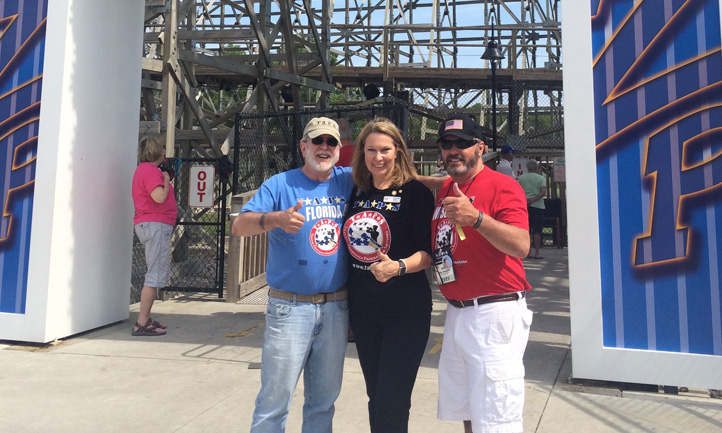The Metaphors of Grief
Author: Emily Munoz
Traveling the country to host Regional Seminars, the TAPS team hears about the sense of freedom that comes from connecting with other people who understand. At TAPS events, you can be yourself – the armor can come off; the mask can fall away. As this happens, our bonds as a TAPS family strengthen and grow. And then, Sunday rolls around, and with it comes the real world – and some of us need that armor back. We don’t want to send you home with your same heaviness. We want you to find safety and hope with us, and we want to help you create this in the worlds to which you must return. Don’t worry; we have a plan.

It's the shared experience of grief, and the easy nature of our seminars, that facilitate open communication during our time together. We get to stop "faking it," to let go of suppressed emotions, and - most importantly - we can say what we actually mean without the impulse to censor for the audience, for manners, or for time. We get to, in many ways, let go of the small talk.
It's the repeated "I'm fine's" and the "One day at a time's" that wear us down in our daily lives. These are the casual exchanges that are further complicated by distractions, scarcity of time, and lack of emotional energy. You are tired of having to answer big questions during small talk. When we're grieving, it's an even larger drain on the emotional reserves; instead of using energy to heal and process, we're using those resources to manage small talk. We associate small talk with not really caring, but with just being polite. It's an exchange of pleasantries, not a real connection.
It's not just us. In The Love Song of J. Alfred Prufrock, T.S. Eliot famously laments about small talk. The character in his poem, Prufrock, finds small talk tedious, stifling, and isolating. He fantasizes about injecting meaning into conversations. When faced with the grind of repetition, shallow interactions, and people who just aren't trying, he considers shock value as a way to actually connect - a way to force communication.
Haven't we all thought about the potential shock value of what we're really thinking? How many times have we been saying one thing while our brains start screaming, "Do you really want to know how I am?" Or maybe someone asks about another family member, a child or a spouse, and that's when it happens. Your mouth answers with pleasant words while your brain replays meltdowns, nightmares, a single, widowed-parent experience on the first day of school. And since that feels like too much, we go through the motions of small talk.
The problem is that grief longs for connection, even though real communication often requires emotional energy we might not have. But when we leave an interaction that consists of nothing but small talk, do we feel any more connected to the world? More cared about or more detached? Have we allowed unburdening, compassion, or empathy? Even if it's easier, is it what we really need when we are struggling with hopelessness and loneliness?
Prufrock dreams of interrupting the exchange of pleasantries, even at the risk of alienating other people. He imagines that, even if other people turn away, angered or uncertain, they will at least have seen a glimpse of his intense inner life. And haven't we all been there, too - wanting to rip the mask off, to show people what it's really like, to stop wearing the grief game face just long enough for someone to get that we're not okay?
Despite temptations to yell everything from, "I hated your casserole!" or "Stop complaining about your husband!" to "Only tell me one to two things about your exceptional children!", we really do risk alienating our support system. We're stuck trying to find the easiest way out. The things we often most desperately need to express are the very things that are most difficult to say. What grief wants us to own is hard to say and hard to hear.
However, yelling our deepest, most vulnerable thoughts at an acquaintance in front of the meat counter at the Piggly Wiggly may not be the most constructive route. It may feel good for a minute, but (and I really hate to say this) venting is not communicating. So, we're back to feeling isolated, separate, embarrassed, and probably a little bit wistful for the time when we weren't the crazy people yelling in the Piggly Wiggly. Moreover, your acquaintance did not deserve that (even if she did have makeup on, or even if his son did get assigned to fly fighters). If others don't know what's screaming in our minds, how do we know what's racing around in theirs? Small talk leaves everyone a little worse for the wear - a little more tired, a little more run down, a little lonelier.
So what is the alternative? It's big talk. Great talk. It's in depth and honest. Great talk demands vulnerability and requires conveying feelings, not just descriptions. Great talk feeds our souls, helps us understand yet move beyond our own pain, and keeps us invested. You know what this feels like if you've ever been to a TAPS event. This is part of what makes it difficult to come home - to face again that the Great Talk that is so easy around your TAPS family yields to timid small talk.
Why is this? Because Great Talk can be difficult to undertake during a parking lot chat, a church hallway hug, or a grocery store encounter. But remember; we have a plan.
Each one of our 2015 Regional Seminars has had a defined theme. In San Antonio, we focused on remembrance, going to the Alamo and placing our losses in the context of American military history. At Fort Campbell, we went bowling - comparing grief to feeling knocked over or the clumsy bowler - hurling hope down the lane and praying for gutter guards to keep things on track. At Green Bay and Orlando, we used a roller coaster to describe the intense emotions of grief. Our time in Connecticut was based on helicopter motion - learning how to hover, rise above, and gain perspective in the absence of a flight plan. In Norfolk, we compared grief to needing to find safe harbor - to being adrift, battered by storms, and needing a place to rest, repair, and plan. Camp Pendleton's theme referenced the iconic Iwo Jima Memorial and was built around claiming ground even in the places we don't want to be - staking out a place for our heroes' legacies and ourselves.
Each theme incorporates a metaphor - the bridge between small talk and Great Talk. Metaphors give us a way to explain how we feel without explaining why. They create an instant connection with the other person in the conversation because you're asking them to be a part of the story, to find a way to relate to you.
Most people can understand the feeling of being on a roller coaster or imagine the last time they felt their stomachs jump into their throats. Most people can develop a mental image, or even a movie reference, for being scared and seasick and looking for a lighthouse, or the shore.
As Frank Campbell, grief professional and longtime friend of TAPS, explains at each seminar, the use of metaphors creates common ground. It not only starts a conversation, but it continues it. And it creates congruence - what you're thinking is what you're saying. Instead of feeling isolated and misunderstood, we create space for empathy, compassion, and connection.
Imagine the possibilities if each of our encounters felt like Great Talk - if we were able to take off the armor and live instead in the truths and triumphs of our grief. With each metaphor, we gain new possibilities to express, explain, and even invite. Come join us, and expand your own emotional language. We want to hear you say, "great talk."
 By Emily Muñoz, TAPS Strategy and Communications Senior Advisor: Emily Munoz can be found speaking at Regional Seminars, where, despite her role, her main priority is to listen - so she can help shape TAPS to meet current and future survivor needs. She believes in the healing power of dogs, dance parties, and great talks.
By Emily Muñoz, TAPS Strategy and Communications Senior Advisor: Emily Munoz can be found speaking at Regional Seminars, where, despite her role, her main priority is to listen - so she can help shape TAPS to meet current and future survivor needs. She believes in the healing power of dogs, dance parties, and great talks.
